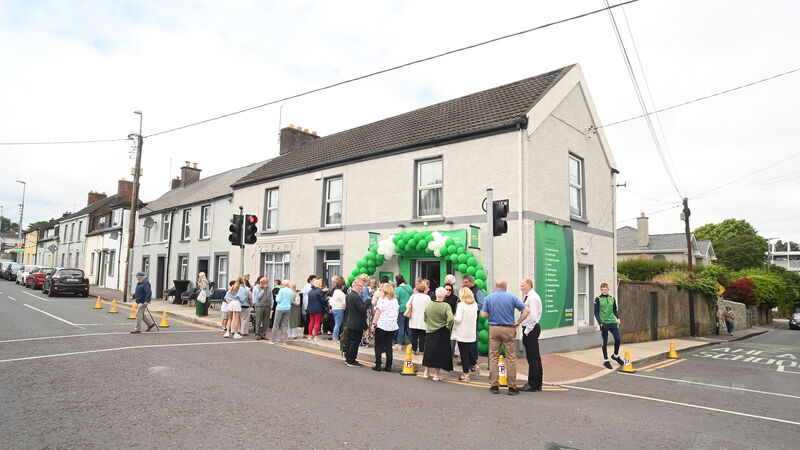Post offices are often the only community service left — don't let them die

The 100th anniversary celebrations at Ballintemple Post Office in Cork last year. A century of service represents trust built over generations, neighbours becoming friends, and deep roots within our community. File picture: Larry Cummins
A recent Grant Thornton report delivered a stark warning. Without immediate Government investment, Ireland’s post office network faces collapse, risking vital services nationwide.
As a third-generation postmaster in Ballintemple, Cork, this resonates deeply with me, not only professionally, but personally. Every day, I see first-hand the critical role post offices play in sustaining local communities.
Without action, we risk losing far more than buildings; we risk losing the fabric of community connection.
Ballintemple Post Office, where I follow in the footsteps of my mother Imelda and my aunt Margaret, celebrated its centenary last June. A century of service represents trust built over generations, neighbours becoming friends, and deep roots within our community.
I've witnessed essential local services gradually disappear. Our AIB branch in Ballintemple has closed, as have the post offices on Albert Road and High Street. Residents, especially older customers, now have to manage tasks online or travel further distances for basic banking.
Local businesses that once thrived beside us, including our butcher and one of our hairdressers, have also closed their doors. Today, our post office remains as one of Ballintemple’s last community hubs, a place where residents can still find face-to-face support.
Each closure increases isolation, particularly among our elderly and vulnerable residents. Many of our pensioners depend on their weekly visits, not just to collect payments, but also for social interaction, conversation, and companionship.
For some, their Friday trip to the post office might be their only outing of the week. I've often supported elderly neighbours through overwhelming administrative tasks following bereavement, such as a widow struggling after losing her husband of 60 years.
Unlike after the birth of a child, when public health nurses come directly to assist, there is no formal support for grieving elderly spouses — we step into that gap, providing essential guidance, comfort, and practical assistance.
The role we play extends well beyond pensions and social welfare payments. We assist people who find digital banking intimidating, those who struggle with literacy or language barriers, and those recently out of prison who have no bank accounts and rely entirely on our services.
We're also trusted advisors to people making financial decisions, guiding them carefully through savings and investment options offered by An Post.
Increasingly, local businesses rely on us for daily banking and lodgments, especially following bank closures. The alternative, travelling considerable distances, often into busy areas with limited parking, is neither practical nor convenient.
Our role has also grown substantially due to online shopping; handling returns, postage, and other transactions. While many of these services are not formally recognised or remunerated, we provide them willingly as part of our commitment to the community.
Throughout the covid pandemic, severe weather events, and every storm that has hit the country, my dedicated staff and I have opened our doors each day without fail. We feel a profound responsibility to our community, understanding the critical importance of continuity and accessibility of services during challenging times.
The Grant Thornton report quantifies the economic and social value of Ireland’s post office network at up to €776 million annually, a figure starkly contrasted by the relatively modest €15 million annual Government investment required - €3 per citizen per year - less than the cost of a cup of coffee.
Without this essential investment, communities will not only face inconvenience, increased isolation, and the permanent loss of trusted local support.
Ireland’s current investment in its post office network, €10 million per year, is significantly lower than commitments made by European neighbours such as France, Italy, and Belgium, which consistently treat their postal networks as essential public infrastructure.
The current funding arrangement in Ireland is set to expire at the end of 2025, and it will not be sufficient to sustain the network into the future.

After serving the Ballintemple community proudly for 26 years, I now face uncertainty about our future. Without secure Government support, my time as postmaster, and perhaps the century-old service we’ve provided, may soon come to an end.
We're not asking for charity or special treatment. We are simply asking for recognition and a level of investment that reflects the real and lasting value post offices deliver to communities across Ireland.
With stable funding, post offices can continue to evolve, innovate, and meet changing local needs. This isn't nostalgia; it's a call for fairness and practical common sense.
The post office network is more than infrastructure, it's a cornerstone of the community, providing essential support for people navigating life's daily complexities. Postmasters are ready to deliver if the Government is prepared to invest.
We’re not asking for a handout. We’re asking for a future.
- Colette Collins is postmaster at Ballintemple Post Office in Cork





